Exploring Global Pharmacy: Coit College of Pharmacy Students Study Abroad in Japan
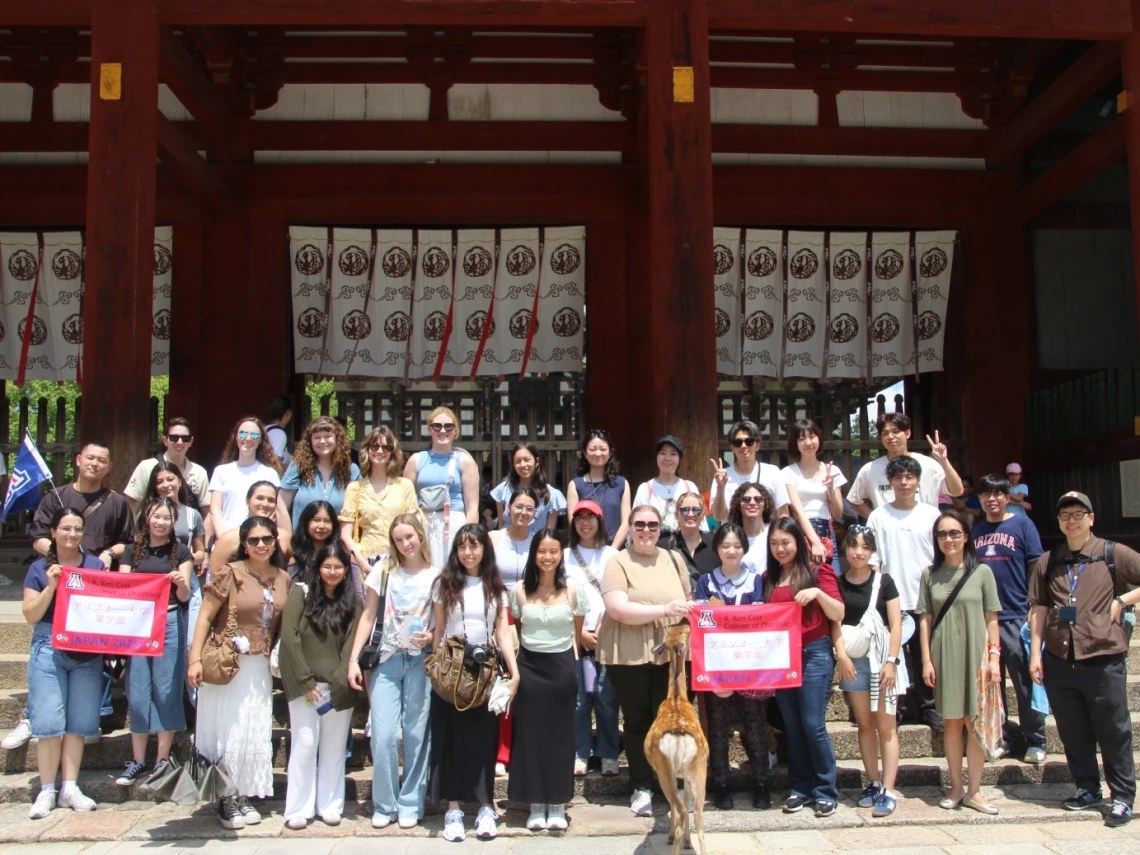
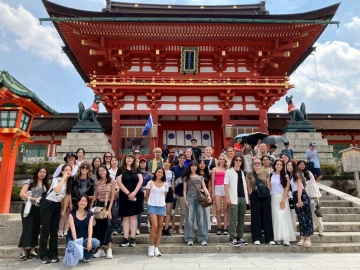
Studying abroad is a transformative educational experience that allows students to immerse themselves in a new culture, expand their academic horizons, and gain a global perspective in their field of interest. Beyond textbooks and classroom walls, it offers a unique opportunity to see the world through a different lens, fostering both personal and professional growth. For students at the R. Ken Coit College of Pharmacy, studying abroad provides invaluable insight into how medication therapy, patient care, and healthcare systems function within different cultural and regulatory contexts.
This past summer, undergraduate and Doctor of Pharmacy students embarked on a 10-day study abroad trip to Kobe, Japan. Hosted by Kobe Gakuin University (KGU) and its pharmaceutical sciences faculty, the program offered students a closer look at Japan’s pharmacy education system and healthcare system.
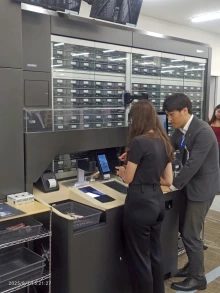
The trip began with sightseeing in the historic cities of Nara and Kyoto, followed by an introduction to kampo, traditional Japanese herbal medicine, at the Tochimoto Tenkaido Fukishima Pharmacy. Students then learned about Japan’s modern healthcare system and pharmacy practices through site visits to Futatsuka Pharmacy and the Kobe City Medical Center General Hospital.
Throughout the journey, students had many opportunities to experience the beauty and culture of Japan, whether exploring local parks and temples, discovering bustling shopping districts, or enjoying traditional Japanese cuisine. They also engaged in meaningful cultural and academic exchanges with students and faculty at Kobe Pharmaceutical University through shared meals, lab tours, and group outings. Ample free time allowed students to further explore Kobe and its surrounding areas on their own.
One of the most enriching aspects of the program is the cultural exchange it encourages. By interacting with their Japanese peers, students develop not only academic insight but also cultural competence, an increasingly vital skill in today’s interdisciplinary and global healthcare environment. The long-standing partnership between the Coit College of Pharmacy and KGU strengthens the foundation for this program, fostering trust, collaboration, and mutual learning.
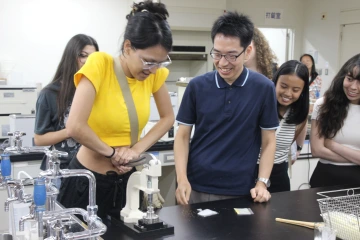
Leading the trip is Michael Katz, PharmD, clinical professor emeritus and director of international programs. With over 100 visits to Japan in the past 15 years, he knows the importance of studying abroad.
“As the faculty leader of the trip, it is very gratifying to see the students discover another country, from a pharmacy professional standpoint and from cultural and social perspectives,” says Katz. “Perhaps the most rewarding part for the students is the opportunity to spend lots of time with student pharmacists in Japan and for the US and Japan students to get to know each other and share their experiences in pharmacy school. Global experiences like this can be life-changing."
Katz’s guidance and insights add depth and context to the experience, helping students navigate and reflect on their academic and cultural discoveries. Ultimately, study abroad programs like this do more than educate; they inspire. Students return not only with new knowledge but with a broader worldview and a deeper understanding of their role as future pharmacy professionals.
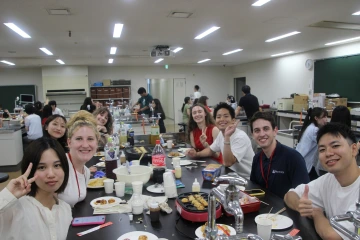
For next summer’s study abroad trip, students are returning to Bangkok, Thailand. The tentative dates are July 31 through August 10, with Mahidol University and its pharmacy faculty as the hosts. The trip is a mix of learning about pharmacy practice and education in Thailand, a variety of cultural and social activities and great Thai food. More information about the trip is coming soon, but to learn more about how you can participate in the study abroad program, contact Michael Katz.
View All the Photos On Our Flickr Feed
Nicole Millanes | Class of 2027
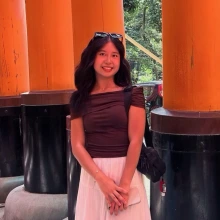
Millanes is one of the few Bachelor of Science in Pharmaceutical Sciences (BSPS) students selected to participate in the Japan study abroad trip, a program previously offered exclusively to PharmD students. As an incoming junior in the program, she had the opportunity to explore the global landscape of the pharmacy profession while immersing herself in Japan’s rich culture. This experience provided her with valuable new perspectives, deepened her passion for pharmacy, and enabled her to build meaningful connections with inspiring individuals. Nicole is currently pursuing a Bachelor’s degree in Pharmaceutical Sciences with a Minor in Business Administration and is expected to graduate in May 2027.
How has this experience changed your view of global healthcare or pharmacy as a profession?
- During the trip, we visited a variety of pharmacy settings and learned about the different systems in place that promote accessibility for patients. Learning about Japan’s universal healthcare system and the way insurance categories are structured broadened my perspective on effective strategies for improving patient health outcomes. Each pharmacy environment we visited highlighted how every sector—whether specialty, community, hospital, or academic—plays a vital role in ensuring both accuracy and accessibility for patients. This experience deepened my understanding of how interconnected the pharmacy profession is in supporting public health.
In what ways did this international experience enhance your cultural competence?
- Being in Japan allowed me to gain new perspectives and adapt to different cultural norms that emphasized organization, respect, and kindness. One of the most rewarding parts of the trip was being paired with a Japanese penpal from each university, which gave me the chance to form meaningful connections and learn about daily life and traditions through many conversations. Through these interactions and cultural experiences, I developed a greater appreciation for values such as respect, efficiency, and community—many of which I want to bring into my own life and future pharmacy practice in the U.S.
What advice would you give to other pharmacy students considering studying abroad?
- For BSPS students, opportunities for pharmacy-related study abroad are still limited, especially ones that are directly affiliated with the U of A College of Pharmacy. Which is why I strongly encourage taking advantage of any program offered through the U of A College of Pharmacy—or even more general programs that catch your interest. Whether or not the trip is strictly pharmacy-focused, engaging in another country’s healthcare system and visiting its pharmacies gives you a unique perspective that strengthens your knowledge and adaptability as a future pharmacist. This trip in particular strengthened my interest in pharmacy and encouraged me to pursue a career in a hospital setting. It also allowed me to learn from PharmD students, gaining insights into their experiences and the advice they had.
What did a typical day look like for you in Japan?
- Before the trip, we were given a detailed itinerary outlining each day’s activities, which helped us stay prepared and organized. Our schedule was thoughtfully balanced between academic and cultural experiences. On lecture days, we attended morning sessions hosted by partnering universities and spent afternoons visiting different pharmacy settings to see how what we learned applied in practice. On cultural days, we explored historical landmarks, local traditions, and some of Japan’s most popular destinations as a group. This balance allowed us to experience both the professional and cultural sides of Japan in a meaningful way.
What advice would you give to your past self before starting this experience?
- Pack light, learn some basic phrases in the language, and be flexible when things don’t go as planned. Most importantly, don’t forget to enjoy the unplanned moments—sometimes these become the most memorable parts of the trip!
Brandon Seeglitz | Class of 2027
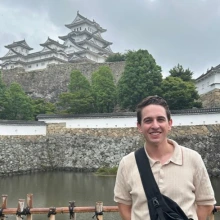
Brandon is an incoming third-year PharmD student at the R. Ken Coit College of Pharmacy, with a strong interest in clinical pharmacy. He recently had the opportunity to study abroad in Japan, gaining valuable international experience and insight into global healthcare practices. Seeglitz is currently pursuing a Doctor of Pharmacy degree and is expected to graduate in 2027.
How does the role of pharmacists in Japan differ from what you've observed in the United States?
- I found it very interesting that there isn’t really a role for pharmacy technicians in Japan, and all of that work is done by pharmacists. The difference was reflected in their utilization of machines for a lot of the tasks that technicians in the United States would do, such as counting, packaging, and preparing medications.
Were there any unique Japanese pharmaceutical practices or technologies that surprised you?
- I was surprised to learn how extensive the practice of Kampo, Japanese traditional medicine, was. In our country, herbal remedies exist but aren’t very common, and they are mostly limited to the supplement aisle. In Japan, there are pharmacies specifically for traditional medicine where you get evaluated by a pharmacist and are recommended a remedy that they prepare on-site. It was also interesting to learn a bit about the science behind their recommendations.
What advice would you give to other pharmacy students considering studying abroad?
- I would recommend students considering studying abroad to dive in and go for it. It was a bit intimidating with the cost and being so far from home for the first time, but the experience is worth so much more. During my time in Japan, the students and faculty in Japan were incredibly welcoming, and it was easy to participate despite not knowing any Japanese. Studying abroad is a once-in-a-lifetime opportunity that helps you grow in ways the classroom simply can’t.
What advice would you give to your past self before starting this experience?
- I would recommend researching the cultural norms in the places they intend to travel. I had never been to a foreign country, and doing so might have saved me from some minor embarrassments, such as walking on the wrong side of the street or not lining up for the trains correctly.
How has this experience changed your view of global healthcare or pharmacy as a profession?
- This trip to Japan deepened my understanding of pharmacy practice in a way that would be hard to learn otherwise. Immersing myself in their culture while learning about their specific pharmacy practices allowed me to see firsthand how healthcare is shared by societal values, norms, and beliefs. These are important considerations when working with patients because they influence how we communicate, and understanding these differences can help build trust and provide effective care.
Kyli Swann | Class of 2027
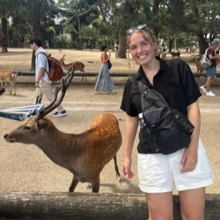
Kyli Swann is currently entering her third year of pharmacy school and is on track to graduate in May 2027. She is passionate about pursuing a career as a pediatric oncology pharmacist. Born and raised in Queen Creek, Arizona, Swann has traveled outside the United States to Mexico on several cruises and, more recently, visited Japan. In her free time, she enjoys staying active through soccer, snowboarding, and running—she’s currently training for a 5K. A food enthusiast, Swann loves sushi, Italian cuisine and is always excited to try new foods. She also has a deep appreciation for music of all genres and has recently taken up collecting vinyl records as a hobby.
Can you share a memorable cultural experience?
- A memorable cultural experience that I particularly enjoyed was our Takoyaki night with the KGU students. We were able to interact with them fully and learn about a common food that they eat regularly. And they were so accommodating to have multiple options to make them, so each student was able to try what they desired. It was such a fun night to be able to learn about their culture while also lightheartedly learning about the students as well.
Were there any unique Japanese pharmaceutical practices or technologies that surprised you?
- I really enjoyed going to the Kampo pharmacy and seeing their diagnostic book with all the different pictures of tongue presentation and how it correlates to a certain disease state, and then being able to treat it with all the herbs and other ingredients they supply to their patients.
How did you prepare for the opportunity?
- Mostly to prepare for this opportunity, I just stayed up to date on the information taught to us previously and made sure to just look at the bare minimum cultural changes that are common, so upon entering the country, I was not disrespectful to their culture.
What surprised you most about yourself during your time abroad?
- I was surprised by how quickly I adjusted to daily life in a new culture and how much joy I found in those small adaptations.
What did a typical day look like for you in Japan?
- For this trip, Dr. Katz would give us time to meet in the lobby and attend to all things on his itinerary, and after finishing his plan, we would either hang out with our penpals or take their recommendations for sightseeing places or restaurants that they felt were fun or a good thing for us to experience.
Alanis Dilic | Class of 2028
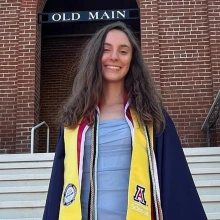
Alanis Dilic is a second-year PharmD student at the R. Ken Coit College of Pharmacy. She earned her bachelor’s degree in Neuroscience and Cognitive Science, with a minor in Biochemistry, in 2024. Her professional interests include community and hospital pharmacy, medication safety, and global health. Dilic currently works as a pharmacy intern at Walmart and has held student leadership roles centered on outreach and cultural engagement. She is deeply passionate about patient education and is committed to bridging health literacy gaps through clear, culturally sensitive communication.
How did you prepare for the opportunity?
- I prepared extensively by studying both the academic and cultural contexts of Japan. Before departure, I read books that provided historical insight into Japanese society and the evolution of its healthcare system, and I also researched the cultural and artistic significance of the sites on our itinerary, such as the temples we visited in Kyoto and several shrines in Nara. Watching videos and reading guides about Japanese customs, daily life, and etiquette helped me understand how to respectfully engage with faculty, pharmacists, and students. On the academic side, I reviewed literature about Kampo, Japan’s traditional herbal medicine, so I would have a foundation for lectures and site visits. This preparation allowed me not only to appreciate the educational components of the trip but also to recognize the deeper cultural meaning of the places and practices we encountered.
Do you think studying abroad should be a standard part of pharmacy education? Why or why not?
- I strongly believe that studying abroad should become a standard component of pharmacy education. Pharmacy is not practiced in isolation; it is deeply shaped by cultural values, historical traditions, and the structure of healthcare systems. By studying abroad, students gain perspective on the strengths and limitations of their own system while learning to value approaches developed elsewhere. In Japan, for example, we witnessed the integration of Kampo into modern practice and saw how cultural expectations influence the dispensing of medications, such as the widespread use of powders and liquids for older adults and children. These observations highlight how healthcare must adapt to meet patient needs within a cultural framework. Experiences like this cultivate cultural humility, broaden professional empathy, and encourage future pharmacists to advocate for patient-centered innovations at home.
What was your experience with interprofessional collaboration in Japan?
- The interprofessional collaboration was extensive and well-structured. Faculty at Kobe Gakuin University (KGU) and Kobe Pharmaceutical University (KPU) prepared a program that combined lectures on Kampo, the Japanese healthcare system, and pharmacy education with practical site visits to community pharmacies, hospitals, and retail pharmacies. With input from Dr. Katz and Akiko Ota, the Japanese faculty organized all transportation and coordinated visits to significant cultural and professional sites, including Nara Park, Todaiji Temple, Kyoto’s Golden Pavilion (Kinkaku-ji), and the Fushimi Inari Shrine. Their generosity was evident not only in the thoughtful design of the itinerary but also in their inclusivity. Many Japanese students joined us despite being on their short summer break and balancing work and personal responsibilities, which reflected their generosity and dedication. Moreover, the faculty ensured that we were welcomed with ceremonies, cultural activities, and group meals. These thoughtful gestures made us feel not only included but also embraced as colleagues and friends. It was humbling to see such effort and hospitality, and it reinforced the value of building strong professional and cultural partnerships.
Were there any unique Japanese pharmaceutical practices or technologies that surprised you?
- Several practices were distinctive. Powdered and liquid medications are widely dispensed in Japan, particularly for pediatric and geriatric populations. During one exercise, we practiced preparing Vitamin C powder in starch-based triangular oblate bags, sealing them, and submerging them in water before ingestion. This method successfully masked bitterness with sweetness and provided an accessible means of administration.
The tour of Yuyama Manufacturing highlighted technological advancements that were particularly notable. Their dispensing systems included robotic arms with seven moving joints capable of aseptic technique, automated packaging that sealed medications in color-coded strips corresponding to morning, afternoon, and evening doses, and automated ointment compounding systems designed for consistency and safety. These technologies demonstrated a highly efficient, safety-oriented approach to medication dispensing that integrates robotics into routine pharmacy operations in a way that could serve as a model for future practice internationally.
How has this experience changed your view of global healthcare or pharmacy as a profession?
- This program broadened my understanding of how culture, tradition, and technology collectively influence healthcare delivery. Observing Kampo’s continued role in patient care underscored the value of respecting cultural traditions within a modern healthcare framework. At the same time, observing Yuyama’s dispensing technologies highlighted how innovation can improve efficiency, safety, and adherence in pharmacy practice.
Equally important was the generosity and inclusivity of the Japanese faculty and students, who provided transportation, prepared numerous activities, and dedicated significant time during their summer break to welcome and support us. Their commitment emphasized that pharmacy is not only a technical profession but also a collaborative, patient-centered one that depends on mutual respect and cross-cultural understanding. The program reinforced the importance of global engagement in pharmacy and strengthened my commitment to advocating for culturally informed, technologically advanced, and patient-focused care in my future practice in patient safety, while respecting the values of the communities I serve in Arizona.
Anything else you’d like to share?
- On behalf of all of the U of A students, I’d like to thank Dr. Katz and Akiko for facilitating such a wonderful trip and guiding us each day in so many different ways. We’ve loved learning more about Japan’s extensive history, culture, and arts from Dr. Katz and Akiko, in addition to hearing stories from their visits to Japan.
I’d also like to extend a huge thank you to the faculty at KGU/KPU for enabling this experience for us as well. It was an honor to be here and to learn from such distinguished professors; this was truly a once-in-a-lifetime opportunity. In addition, the faculty and students have been so welcoming, kind, and generous, and their events for us have been so thoughtfully organized. Their support and enthusiasm have made our stay here truly special, and we all really appreciated their time and dedication to each event and lecture. We will carry this knowledge and these memories with us, always.
Veronica Samala | Class of 2027
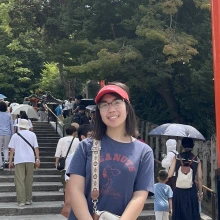
Veronica Samala is entering her third year of a Bachelor's program in Pharmaceutical Sciences this fall. She volunteers as an undergraduate research assistant in the Cherrington Lab, where she contributes to research on the effects of heat on ADME (Absorption, Distribution, Metabolism, and Excretion) using animal models. Outside of academics, Samala enjoys traveling—one of the main reasons she was excited to join this trip. She is grateful for the opportunity to explore pharmacy in a global context, experience a new country, and immerse herself in a different culture.
Can you share a memorable cultural experience?
- Visiting the various temples and shrines helped me to understand the differences between the Shinto and Buddhist religions. Shrines are Shinto; temples are Buddhist. One of my penpals taught me how to pray at Todai-ji temple, which is known for the large bronze Buddha housed inside. You throw a coin into the offering box, bow twice, clap your hands twice, then hold the position and pray. Once you’ve finished, you bow and leave. My penpals and I also drew omikuji (fortune slips) at Fushimi Inari Taisha, a famous Shinto shrine known for its thousand red torii gates. I was lucky enough to draw a very lucky fortune!
Were there any unique Japanese pharmaceutical practices or technologies that surprised you?
- Learning about kampo was something that I was looking forward to, due to how integrated it is in Japan’s healthcare system. Kampo is derived from Traditional Chinese Medicine, has been around for 2000 years, and is widely used in Japan. I was surprised to see just how commonly used it was, as it wasn’t only restricted to kampo pharmacies. Hospitals used it too! Some formulations were even covered by insurance. Some of the people I talked to considered it to have fewer side effects than Western medicine, and also considered it a good treatment for chronic conditions.
In what ways did this international experience enhance your cultural competence?
- This experience made me realize the importance of communication, and I really admire the Japanese students’ enthusiasm and kindness while they talked with us. Communication is a two-way street; my knowledge means nothing if I can’t find a way to make it understandable. In addition, the things I learned about the insurance and healthcare system in Japan make me more aware of how care is approached in both countries.
What advice would you give to other pharmacy students considering studying abroad?
- Give it a shot, and get excited for it! Think about any interests you might have that are connected to the country, personal and professional. Even if it’s initially little, you will come out of the trip learning more than you came into it with. Make the most out of the free time you have each day, too!
Do you think studying abroad should be a standard part of pharmacy education? Why or why not?
- I think that studying abroad should be a standard part of pharmacy education, since it provides greater opportunities for students to broaden their knowledge about different cultures and the practice that they intend to go into. Cultural competency is an extremely important skill to have and practice: how can you reach a wider range of care if you don’t fully understand the scope? Having penpals to connect and talk to helps to form connections overseas, and since BSPS students like myself were welcomed to join this trip, this allowed us to meet and connect with PharmD students and faculty that we wouldn’t normally have the opportunity to talk with.
Julian Arrieta | Class of 2027
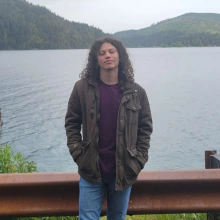
An Arizona native, Julian Arrieta earned a bachelor’s degree in Pharmacology and Toxicology from Arizona State University and is now entering his third year in the PharmD program at the R. Ken Coit College of Pharmacy. He is pursuing a career in critical care medicine, with a potential focus on cardiology, and plans to apply for residency following graduation. Passionate about travel and cultural exploration, he was excited to join this study abroad program. Although this was his first time traveling internationally, the opportunity to visit Japan, a longtime dream destination, was unforgettable. The experience exceeded his expectations and deepened his interest in global perspectives on pharmacy and healthcare.
How does the role of pharmacists in Japan differ from what you've observed in the United States?
- In Japan there is much less of an emphasis on pharmacy technician usage, especially in community pharmacy. All the community pharmacies I visited were entirely staffed by pharmacists. Even in hospitals, they only had a handful of technician assistants, whereas in the hospital I work in, the technicians easily outnumber the pharmacists. As such, the pharmacist takes on much more of the workload in Japan, such as handling the compounding of various drugs and IV preparations, which are generally done solely by pharmacy technicians in the US.
Were there any unique Japanese pharmaceutical practices or technologies that surprised you?
- The two things that surprised me the most regarding Japanese pharmacy were, ironically, at opposite ends of the technological spectrum. On the one hand, Japan has incredibly advanced robotics to do almost every physical task you can think of in a pharmacy, including making IV chemotherapy preparations. On the other hand, they still regularly utilize ancient traditional eastern medicine techniques involving the use of a variety of plant and mineral ingredients, known as Kampo. The way they integrate medicinal recipes that are hundreds of years old with cutting-edge modern technology on a day-to-day basis is amazing, to say the least.
What was your experience with interprofessional collaboration in Japan?
- Everyone involved in the study abroad experience was incredibly kind and professional. The Japanese students were very polite, generous, and did not hesitate to take the U of A students in and show them not only Japanese pharmacy, but also many regular aspects of Japanese culture as well. They were all very eager to take us out to dinner and spend casual time with us outside of our lectures. Additionally, they were generally quite interested in American culture and how pharmacy works in the US, with some talking about how they wanted to work for Western companies like Pfizer or Eli-Lilly. Even the Japanese pharmaceutical companies we toured, despite seeming intimidating at first, were warm and inviting and made everyone at ease.
How has this experience changed your view of global healthcare or pharmacy as a profession?
- Before this, I honestly never thought much about how pharmacy was practiced outside the US. Seeing the differences and similarities in Japan, especially in the hospital setting, reminded me that healthcare really is a global issue and that there are a lot of things countries could learn from one another in the pursuit of better patient outcomes. Personally, I would like to see the adoption of some of the robotics technologies that I witnessed in action in Japan. In some ways it also made me more grateful for American pharmacy practices, since the average salary of a pharmacist outside the US and especially in Japan is much lower. Also, while pharmacists in the US are gaining more prescribing independence and similar powers in the US, Japanese healthcare is still a very physician-dominated field.
What advice would you give to other pharmacy students considering studying abroad?
- If you are on the fence, you should absolutely do it. I have always been very interested in learning about other cultures, but being in a foreign country and interacting with its people is a completely different experience. It expands your entire worldview and really drives home the fact that there are billions of other people around the world living vastly different lives with their own unique experiences. Yet at the same time, they are still just regular people, and you will be even more surprised to find out how much you have in common with one another. I think that this study abroad program allowed us to interact with and get to know Japanese people at a much more intimate level than one would get on a regular tourist trip.

